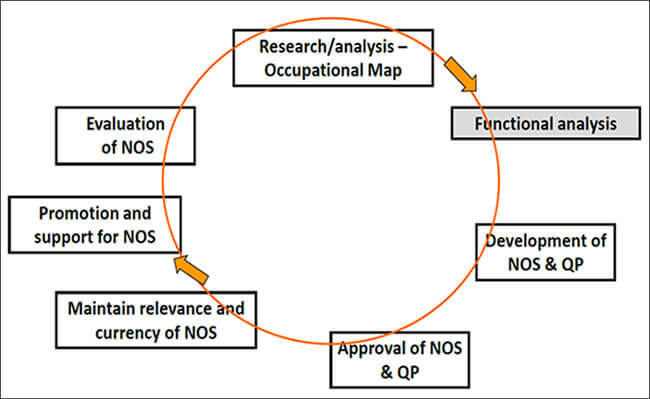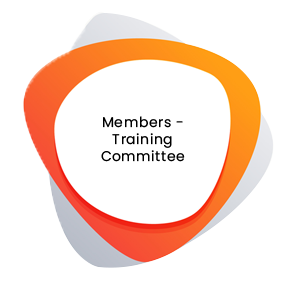
NOS Committee Members
NOS Committee Members
National Occupational Standards (NOS)
Definition : National Occupational Standards (NOS) specify the standard of performance an individual must achieve when carrying out a function in the workplace, together with the knowledge, skill and understanding they need to meet that standard consistently.
NOS are used for two main purposes:
- To develop curriculum for the delivery of training; and
- To develop assessment instruments and tools for the assessment and certification of learners.
- Each NOS defines one key function in a job role.
- Each NOS must be a concise and readable document,
- usually consisting of no more than five or six pages (some are only one or two).
- In their essential form, NOS describe functions, standards of performance and knowledge/ understanding
Qualification Pack (QP)
Definition: Qualification Pack (QP) defines the set of NOS which are aligned to Job Roles. Same NOS may feature in QPs of multiple job roles, across multiple industries & trades -e.g. , NOS on ‘Customer Service’ may be applicable to
- Store Keeper (Technical) and Store Manager in Retail (Different Job Roles; Different sector)
- Health, Safety and Environment NOS may be applicable in most sectors across different job roles.
Process Flow: NOS Development

Brief on National Occupational Standards (NOS) Committee
- NOS specify the standard of performance an individual must achieve when carrying out a function in the workplace, together with the knowledge and understanding they need to meet a standard consistently.
- Each NOS defines one key function in a job role. Each NOS must be a concise and readable document, usually consisting of no more than five or six pages (some are only one or two). In their essential form, NOS describe functions, standards of performance and knowledge/understanding.
- The NOS are laid down by employers (through their SSCs). A set of NOS, aligned to a job role, called Qualification Pack, would be available for every job role in each industry sector. These drive both the creation of curriculum, and assessments. Thus National Skills Qualification Framework (NSQF) will theoretically make it possible to drive competency based training for every job role in industry. It would be possible for all current vocational courses, like MES, ITI Courses, or similar vocational courses in schools, colleges and polytechnics to be aligned to job roles at specific NSQF Levels. An ITI Course in Plumbing would say they are training for plumbers at NSQF Level 3. Similarly a polytechnic, training in fashion design, may say it is training for NSQF Level 5 for Garment Cutters.
- MEPSC shall be leading skill development initiatives in four key segments as under:-
- Professional Skills – Generic Skills required for bridging gap between institute/ university curriculum and industry requirement, induction training for new employees/ Trainees (Graduate Engineer/Management/Diploma)Management/ Professional/ Soft skills for all job roles/ positions across sectors and levels;
- Entrepreneurship Skills – Business Skills for those wishing to be self -employed or Employees. Soft Skills required for every role/position in every sector.
- Training Skills including for Management Consultant, Trainer/ Instructor/ Faculty, Assessor/ Examiner; and
- Office Management skills – Behavioural/ Management skills such as e.g. functional skills for HR, Marketing & Sales, Administration, Commercial, Purchase & Stores etc.
- MEPSC NOS development and related activities are being piloted by members of its NOS Committees. The three Sub-NOS committees are industry represented bodies being steered by members of :-
- Office Management and Professional Skills Committee
- Entrepreneurship Committee
- Training Committee
Tasks and Role of NOS Committees
- Main task is to oversee the development of the QPs/NOS and provide Quality Assurance and Quality Control
- Scrutinise and vet the RFP for shortlisting Consultant
- Conduct search cum selection for outsourcing the contract to Consultant
- Identify the relevant Job Roles
- Assist in developing the aspirational career path
- To advise and guide Consultant on Job Roles for which QP/NOS are to be prepared
- Provide industry perspective / domain expert inputs for NOS development to Consultant and in-house NOS Team for identified Job Roles
- To identify stakeholders for each QPs and to develop a stakeholder management plan and industry engagement plan
- To quality assure the draft NOS and QPs, prepared to ensure that they meet NSDC requirements
- Mentor, guide and oversee the internal NOS core team
- Provide industry connect and linkages for jobs
- Advise & guide SSC to develop Examination & Evaluation/Assessment Criteria and Certification Methodology for Trainees
- To finalize, adopt and ratify the NOS & QPs, prepared














 by Viral Web Tech
by Viral Web Tech